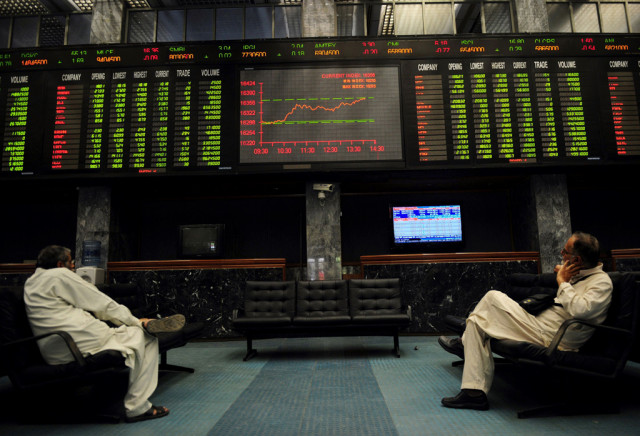Stock markets: After years of effort, investment flow could not be eased
Process of removing restrictions may take another three to four years.

An inflow of $569 million was recorded in the last fiscal year that ended on June 30. PHOTO: AFP
Efforts to ease the flow of portfolio investment between India and Pakistan have run into snags after years of groundwork by regulators and representatives of capital markets from both sides of the border resulted in little progress.
According to Karachi Stock Exchange (KSE) Managing Director Nadeem Naqvi, the lack of progress towards streamlining cross-border portfolio investments is due to the Indian Ministry of Home Affairs, which has deferred final clearance until sometime later.
“The boards of the KSE and Bombay Stock Exchange (BSE) had agreed in principle to create a system under which the BSE Sensex Index could be traded on the futures counter of the KSE, and the KSE-30 Stock Index Futures could be traded on the BSE futures counter,” Naqvi said while speaking to The Express Tribune on Saturday.

India allowed Pakistani citizens and companies to invest in India in all sectors except defence, space and atomic energy in August last year. This was immediately followed by another announcement that promised to reduce items in the sensitive trade list by almost one-third besides allowing Pakistanis to buy shares in Indian companies.
“All we needed was market makers on both sides of the border to quote bid and offer prices,” he said, adding the two apex bodies regulating the equity markets in both India and Pakistan supported the move.
Pakistani equity market is lucrative for foreign investors, Naqvi noted, as over $400 million has flown into the country as international portfolio investments in the last six months.
An inflow of $569 million was recorded in the last fiscal year that ended on June 30 as opposed to an outflow of $189 million in the preceding fiscal year.
But have Indian investors missed out on the booming KSE altogether? The answer to this question is not easy, says Muhammad Ali Taufiq, Head of Equity Strategy at Elixir Securities, a brokerage house affiliated with the Dawood Group.
“Many traders working on foreign investment desks of brokerage houses believe that Indians invest in Pakistani equities through international brokerage houses based in Singapore and other countries. But there is no way we can have any evidence of it, as international brokerage houses will never reveal the identities of their clients,” Taufiq told The Express Tribune.

Reports also emerged last year about some Indian brokerage firms joining hands with their Pakistani counterparts to trade on the Pakistani stock markets. The kind of collaboration envisaged was along the lines of arrangement that many American financial services firms have had with local companies for many years. But Taufiq says no major development has taken place in this regard so far.
“Even if everything goes well, easing of investment restrictions is likely to take at least three to four years,” he said.
Replying to the question whether inflows into Pakistan will be greater than outflows, should cross-border portfolio investment grow, Taufiq says it will depend on which of the two economies is growing faster at the time.
However, he predicts that the Pakistani equity market is likely to be better off in case the restrictions are lifted because it is cheaper than its Indian counterpart.
In 2012-13, the price/earnings multiple for BSE Sensex Index was 17.2 times. In contrast, a P/E multiple of 8.5-9 times is expected for the KSE for the next fiscal year, according to Foundation Securities, a brokerage house associated with Macquarie Securities, a global name in stock trading.
“The multiple for our market is almost half of the multiple of the Indian stock market, which makes us viable for Indian investments,” Taufiq said.
Published in The Express Tribune, July 22nd, 2013.
Like Business on Facebook, follow @TribuneBiz on Twitter to stay informed and join in the conversation.


















COMMENTS
Comments are moderated and generally will be posted if they are on-topic and not abusive.
For more information, please see our Comments FAQ